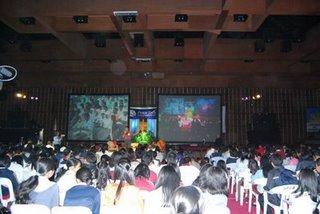|
|
Philippine Youth Dialogue for Peace by Videoconference
un articulo por Meg Villanueva
As the war in Mindanao continues to displace and dismember families, PeaceTech Inc. calls on the youth of Baguio to dialogue with the youth of Cotabato through a live video conference on August 29, 2008, 8a.m. at the Baguio Convention Center (Baguio City venue) and Notre Dame University Auditorium (Cotabato City venue) and to discuss about how real peace can be achieved in the country.
PeaceTech Inc., a Philippine non-government organization, aims to connect hundreds, if not thousands of youth around the country in a live videoconference on giant screens. The topic is on Embracing Diversity: How are Islam and Christianity Religions of Peace? The activity hopes to foster understanding between Muslim and non-Muslim youth, reduce prejudice and discrimination, and find ways on how to work towards peace, even beyond the video dialogue event.
"There's no better way to reduce tension and ignorance than by bringing people face to face," says PeaceTech's Jakarta-based President, Robin Pettyfer. "And we are doing this in on a mass scale! By bringing two sides together they can realize for themselves that the other is not to be feared. This is especially useful in societies torn by misunderstanding and tension."
Program Manager Meg Villanueva said that the Baguio-Cotabato dialogue is just the first in a series of local dialogues linking Luzon and Visayas with Mindanao. The succeeding dialogues are between the youths of Bacolod and Davao Cities; and Zamboanga City and Manila and in early 2009, a dialogue between the youths of Indonesia and the Philippines. "It's time that we listen to what the young people have to say - to give them an opportunity to discuss their concerns, and give them a voice in shaping society. "
The event will feature Muslim and Christian guests who will share their real life stories of discrimination and armed conflict; Muslim and Christian scholars; guests who will share about the ‘benefits of unity and cooperation'; tasteful entertainment; educational videos; and small group discussions where youth can process what they are learning.
Even Cotabato-based PeaceTech Vice President Jimmy Yau is hopeful that hundreds of participants in the Cotabato end will be able to bring home learnings from the activity. He adds that "we are in a time where we are poised to make a difference because now is the time when prejudices are high and the seeds of discrimination are taking lives as we speak."
Aside from the video-conference, PeaceTech conducts holistic Peace Education Workshops for youth within the local area where they will hold videoconferences. The course revolves around the following topics: Fundamentals of Peace and Conflict; Islam and Christianity as Religions of Peace; Dialogue Principles and Practices; Facilitation Skills Training; Peace and Technology; and Leadership and Youth Empowerment. The project identifies 35 Peace Ambassadors from different religious and ethnic backgrounds coming from various universities and groups within the cities mentioned.
|








|
DISCUSSION
Pregunta(s) relacionada(s) al artículo :
How can we produce positive peace events?, that open peoples hearts as well as their minds?
* * * * *
Comentario más reciente:
Hello everyone,
Would like to share with you the successful videoconference we had last August 29, 2008, where we linked about 2,000 youth from Baguio and Cotabato Cities. Our program in Indonesia, which linked youth from Banda Aceh and Yogyakarta, can also be found on our website, www.peacetech.net
Thank you for your support!
_ . _ _ . _
WAGING PEACE VIA INFORMATION TECHNOLOGY
Philippine Daily Inquirer, Sept. 10, 2008
BAGUIO CITY - Through two movie house-size screens installed at the Baguio Convention Center, over 1,000 high school students played a scissor-paper-rock game, held workshops, exchanged testimonies and ideas, and prayed and sang with their fellow students in Cotabato City.

The theme of the three-hour Internet-based video conference on Aug. 29 revolved around building peace and mutual understanding through dialogue between and among Christian, Muslim and even non-Christian and non-Muslim youth.
The virtual conference's theme struck a relevant chord with the conflict and violence in a few areas in Mindanao, which were ignited by a scuttled proposed agreement based on an expanded Bangsamoro territory.
Organized by PeaceTech, the video conference enabled students of Baguio and Cotabato, who were grouped into 10 to 12, to reflect during a 25-minute workshop on how ignorance breeds prejudice, which eventually leads to conflict.
PeaceTech is a nongovernment organization holding peace-building-geared video dialogue series among Muslim and non-Muslim youths in various countries. Among its supporters is Queen Rania al Abdullah of Jordan.
In the same workshop, the students pondered upon how they could benefit if Filipinos were united and how they would envision the future of their country.
In another workshop, the students were asked about what they loved in their faith, what three steps they could take to promote better Muslim-Christian understanding, and what they could do to help promote peace.
Battling ignorance
Volunteer facilitators synthesized the reflections of each of the workshop groups and two representatives from Baguio and one from Cotabato were chosen to report a summary of what transpired in both workshops.
The representatives recognized ignorance as the root of prejudice, which, in turn, leads to stereotyping and generalization that create distrust and hatred and ultimately conflict. . ... continuación.

|
|









